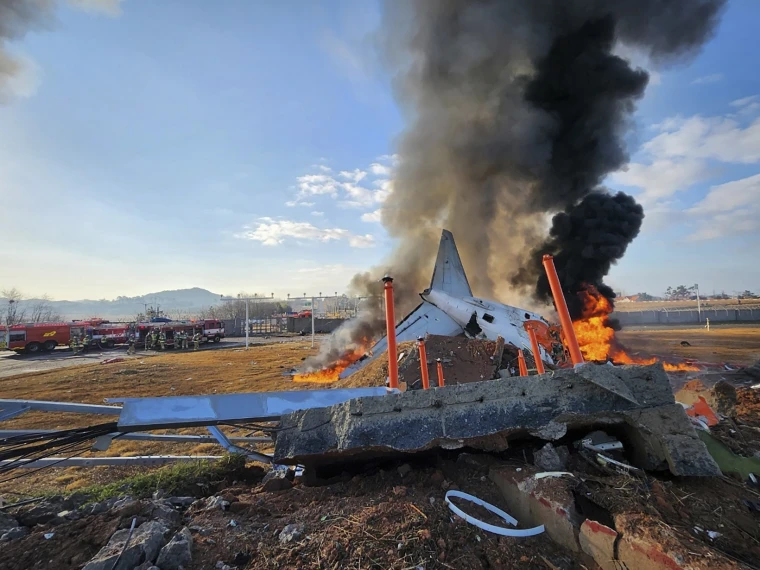Tragedy struck twice on December 16, 2024, when a Eurocopter AS350 crashed near Potrero, California. On December 29, a 15-year-old Boeing 737-800 operated by Jeju Air crashed at Muan International Airport in South Korea. This tragic event resulted in the deaths of 179 people, including 175 passengers and 4 crew members. Only two flight attendants survived, rescued from the tail section of the aircraft. From the day of the crash to January 4, 2025,” South Korea’s acting President Choi Sang-mok declared a week-long mourning period”, as reported by CNN World. The Jeju Air crash, according to the article “Anger as families wait for victims’ remains after South Korea plane crash,” occurred during the landing phase following a bird strike, (where an aircraft collides with a bird or flock of birds); the pilots then declared a mayday and encountered difficulties deploying the landing gear, making the plane land without the wheels, ultimately causing it to overrun the runway and crash into a concrete embankment.
This has caused high tension in South Korea, taking 5 days to investigate further; Causing others to ask what the aviation experts could have done better, in the article “Runway design may have cost lives in South Korean air disaster, experts say” where a professor in civil engineering namely Najmedin Meshkati stated”the use of concrete rather than a metal tower or pylon installation was “unusual”.This observation also aligned with college student Lancy Lesly’s studying Aviation Management views as she offered to share that the “U.S could have proactively offered the expertise of the National Transportation Safety Board or NTSB since they have a strong military presence in Korea.” The U.S. has a strong presence in Korea as both countries pose a threat to North Korea, so the U.S. helping South Korea using NTSB wouldn’t be a problem. This could have included sharing advanced investigative techniques, providing access to specialized equipment South Korea hasn’t touched yet, and offering guidance on better practices in the future for when another bird strike occurs. The NTSB expertise extends beyond technical analysis as they are also skilled in the investigation of human factors, system safety, data analysis, etc. This is particularly crucial given the tragic loss of life and the impact on the global aviation community. The incident underscores how paramount the unwavering safety protocols are and emphasizes the heightened anxiety experienced by air travelers.
Many families were devastated by the amount of family members left behind, many of whom were unable to send a proper goodbye before the flight departed from Bangkok, Thailand. Most of the passengers were South Korean nationals with two Thai nationals on board. The tragedy put South Korea into a period of deep mourning. Families in Korea waited 6 days to identify their loved ones. ABC News reported that heartbreaking scenes unfolded as families embraced, wept, and struggled to process the devastating loss. The impact of this tragedy on the families and the nation as a whole is profound and enduring.
While South Korea has finally emerged from its national mourning period, the grieving process continues for those who lost their loved ones in the Jeju airplane crash. Many families in Korea hold memorial services to honor their loved ones and offer condolences. Seo-ah Rodriquez, a South Korean college student living in the U.S. shared that “the government helped provide support for [his] family through financial aid and counseling.” This support has been a crucial element in helping families cope with the immense tragedy. South Koreans are holding memorial services past the official mourning period to keep the memories of the victims alive. These acts according to article“As grieving families mourn the victims of South Korea plane crash, investigators extract black box data”such as donating to relief funds, visiting the crash site, and having national mourning and memorial services serve as a powerful tribute to those who perished and a source of strength for their loved ones.
The Jeju crash serves as a poignant reminder of the fragility of life as well as the safety concern of aviation disasters. Beyond technical investigation, it’s important to remember the human cost of these tragedies leaving behind grief, trauma, and unanswered questions. As South Korea grapples with this profound loss it’s important to have a reflection on aviation safety or the human cost of air travel after all that occurred.
Donations to families can be made at: Hope Bridge






















Ella Djilani • Jan 10, 2025 at 12:12 pm
Lots of great information! Thanks!